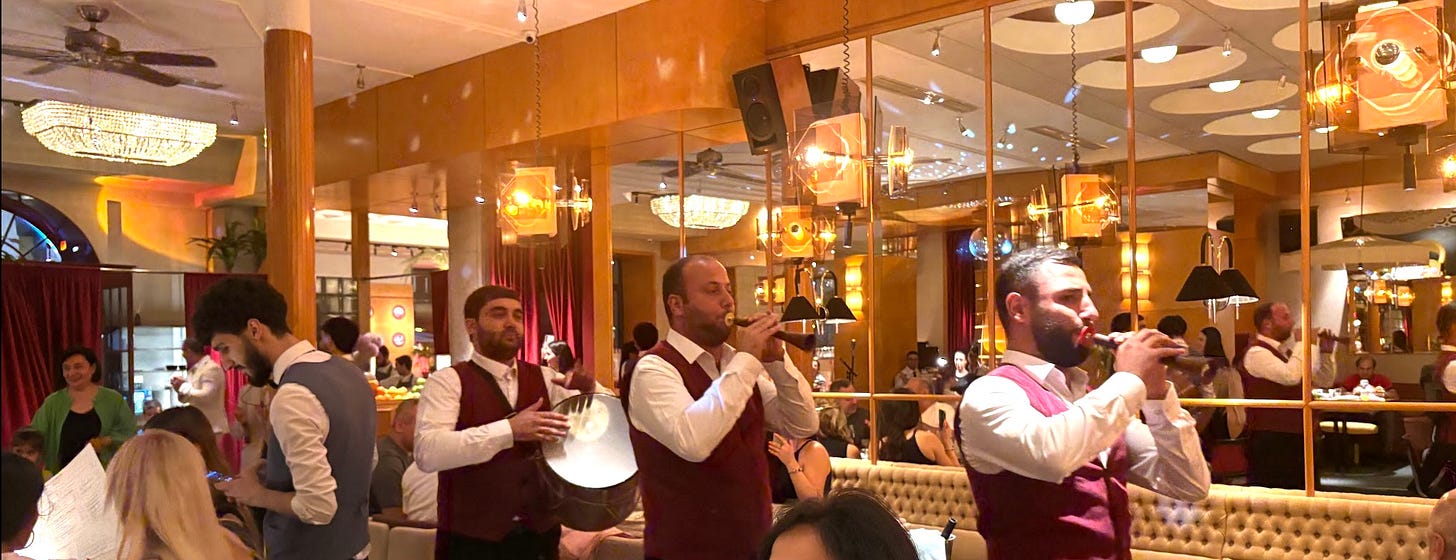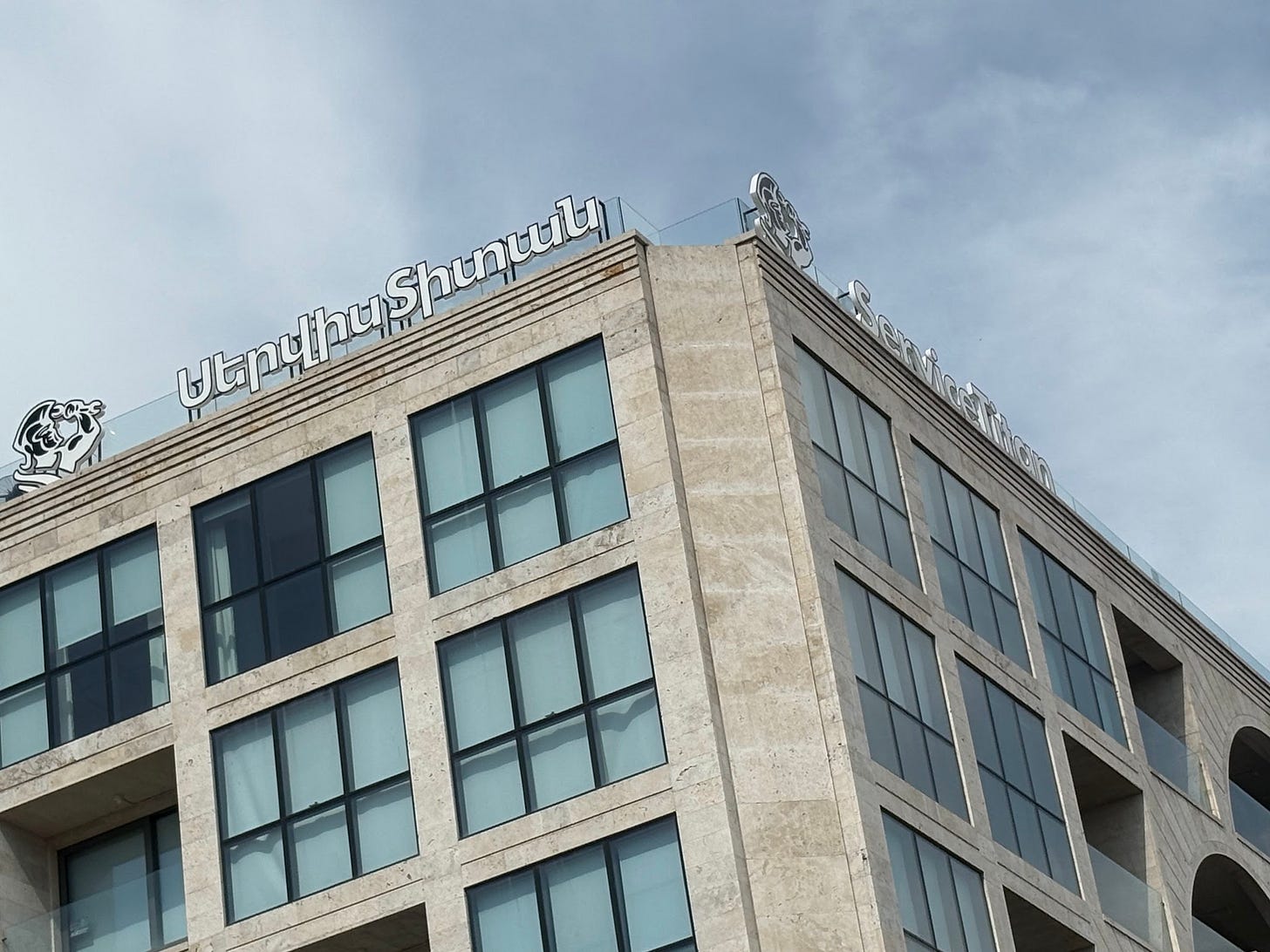Armenia Isn't Imitating—It's Iterating
Twenty years ago I kissed the tarmac on my return to the US. Last week, I almost extended my stay. Reflections on 20 years of visits to a developing nation.
My kids are sipping boba tea on Northern Avenue while the national symbol of Mount Ararat towers over us from across a closed border. One scene sums up modern Armenia: impossibly cosmopolitan, historically complex, busy rewriting the rules.
This was my fifth visit in 23 years, from the raw just-post-Soviet days of 2002 to last week with my young family. What I’ve seen isn’t a developing nation playing “catch up” to the West. It’s a country aiming for entirely different finish lines.
Then vs. Now
2002: I felt exotic as an Armenian-American struggling with local vernacular. Cash-only economy. Soviet-era customer service (read:none).
2025: I heard four languages before my first flat white at a 24/7 walk-up coffee bar. Restaurants don’t hit stride until 10 PM. Tap-to-pay works at village markets. Service that might make a Japanese storekeeper proud.
The gap between the developing world and the west isn't just closing—it's being redefined.
The Food Revolution
Walking through the capital Yerevan today is a foodie paradise. Syrian and Lebanese Armenians fleeing their home countries' wars brought culinary expertise. Global tourism brought demand. A three-course meal at a gorgeous, delicious restaurant: ~$15 all-in. Not cheap by local standards, but absurdly reasonable by any other measure. The boba my kids ordered (yes, there are now multiple vendors) passed their expert evaluation with flying colors.
Imagine Soviet customer service (aka, no customer service)? Warmth is now the default—a remarkable cultural shift that happened in just about one generation.
Digital-First Economy
Here's where it gets interesting for my fellow VCs: Armenia just leapfrogged decades of payment infrastructure evolution.
Everywhere—from Yerevan's coffee shops to mountain village markets—accepts contactless tap-to-pay. No hesitation for sub-$1 purchases. No annoying fees. No paper currency fumbling. When I asked locals how this magic trick happened, they shrugged: "The ease just overcame all the usual concerns."
This isn't just convenience that boosts spending—it's economic transformation and is filling the government’s coffers. What was a hidden cash economy transformed into transparent digital ledgers with instant tax payments. The government essentially modernized its entire revenue system by making payments frictionless.
Tech-Powered Middle Class
Those bustling cafes aren't filled with tourists—they're locals with resources. In a landlocked country that prides itself on education, salvation came through technology.
ServiceTitan, with Armenian co-founders, had an incredibly successful IPO and is now a $10B company with a huge local presence. The government just announced a $500M AI factory with Nvidia chips. Unicorns like PicsArt, CodeSignal, and Krisp maintain strong Armenian presence. A new middle class emerged, powered by code and global connectivity, and rather than being threatened by AI, traditional barriers to remote tech teams continue falling because of it (think access to elusive design and product skills). Armenia positioned itself perfectly for this shift.
Everyday Evolution
The English Takeover: Every person under 25 speaks excellent English alongside Armenian and Russian. Store signs feature Armenian names transliterated in English. You could learn to read Armenian just by shopping for a week.
Street Dogs Reformed: For those that visited developing nations, you might be familiar with terrifying packs of unpredictable street doggos. Now, they are ear-tagged with a color system (green = friendly, yellow = cautious, red = avoid) and significantly reduced through neuturing programs. They went from terror to adorably welcome quirk.
Spanish Hours: Streets buzz at midnight on weeknights while stores start to open around 10 AM. Long dinners, people-watching, group walks—a built-in social infrastructure that strikes a crazy contrast with US public life that mostly stops at 8PM.
What the West Can Learn
This transformation forced me to question what "progress" actually means. Two uncomfortable observations:
Community vs. Individual Fortresses: We've built 5-star resort homes—chef's kitchens, home theaters, manicured landscapes—then wonder why we're isolated. Armenia invested in communal spaces that enable spontaneous socializing. You can literally take a midnight walk and bump into friends instead of planning everything in advance.
Affordability vs. Extraction: After eating Michelin-quality food served by people you enjoy interacting with for $15, then comparing it to your $60 Chipotle experience with the “tip me 18% before I even do the thing” theater... something's fundamentally broken. And we all know it.

The Biggest Picture
Countries like Armenia aren't playing catch-up anymore—they're building on entirely different models. Like Japan's post-WWII railway master plan that still makes American infrastructure look primitive, these nations are embracing blank-slate advantages.
Armenia chose digital payments over banking bureaucracy. Community spaces over individual isolation. Affordable excellence over extractive mediocrity.
The question isn't whether Armenia is becoming more like the west. It's whether the West is open to, and learning from, a world where other models are… pretty attractive. Armenia has many serious challenges, but the point is that Armenia isn’t imitating; it’s iterating.
As a VC, situations with strong emotions, misaligned incentives, and go-along-get-along dynamics scream disruption opportunity. And that disruption isn't just coming from Silicon Valley anymore.
I went to Armenia excited to see how much it had changed. I came back wondering how much we need to.
Note: this is unabashedly written from the perspective of a traveler with resources, and my intention is not to gloss over the serious geo-political challenges facing the nation and its residents, but to focus on the slope of the curve.







All of this is great but have you looked behind the shiny facade? The country dumps all the sewage in rivers and lakes and doesn’t have a single decent sewage treatment plant. The Michelin quality dish for $15 might as well be made with local produce that’s irrigated with a random sewer filled river.